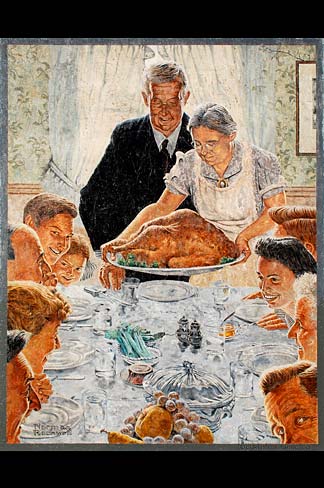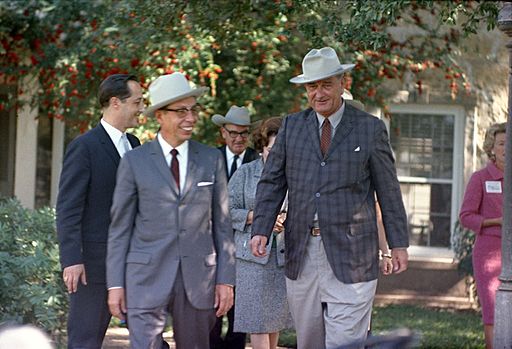The Family Dinner

A mural replica in Silverton, Oregon, of Norman Rockwell’s Freedom From Want painting, one of a series he did in 1943 illustrating the Four Freedoms articulated by President Franklin Delano Roosevelt. Photo from the Oregon State Archives. While Mr. Rockwell was depicting an ideal promulgated by a liberal Democratic president, his choice of models and their placement in a hierarchy at the family dinner table fits in well with the current conservative mythos of how Americans should look and comport themselves.
Bill Maher has similarly profited from the projections of many liberals, who seem to think a person who is for the legalization of marijuana and against the policies and tenure of the current president cannot possibly be as reactionary as he really is in many ways. He is reactionary in his statements about Muslims and about gender politics and about how he believes political correctness is more corrosive to our democratic republic than the rapaciousness of capitalist exploitation. Most of all he is reactionary in his repeated assertions that no one to the left of himself among the Democrats can defeat the current president in 2020 because he believes most Americans are firmly in his, Bill Maher’s, camp on most everything that matters.
From Woody Allen’s 1977 film Annie Hall, a diversity of viewpoints and attitudes, some more subdued than others.
The fiction of Mr. Maher’s liberalism is propped up also by uncritical viewers on the left who give his pontifications on Democratic politics more respect than they deserve. Reactionary centrists such as Mr. Maher are uncomfortable with the infighting that always prevails among Democrats, and they see it as giving aid and comfort to the other side while weakening their own. People like Bill Maher may as well decry the spots on a leopard. Dissension is in the nature of liberal Democratic Party politics; it’s what differentiates them from the other side, too many members of which fall obediently into line like good little authoritarians.
Journalist Glenn Greenwald in a December 2016 appearance on The Jimmy Dore Show. Warning: one naughty word.
Bill Maher is like the brother-in-law at a large family dinner where all the members are squabbling in a free wheeling manner, and he sits there with a slight smirk, believing he’s smarter than he really is and eager to toss out a snarky remark to show he’s superior to what’s going on around him at the table. He and people like him, with an authoritarian streak in their character despite the liberality of some of their views, cannot understand how argument and dissension strengthen, not weaken, Democratic Party politics, and ultimately democracy itself. Falling in line without questioning is for autocrats and their followers. The ancient Athenians were not without their fair share of faults, but today most people recognize their society, noisy and argumentative as the scenes at their family dinner tables might have been, as more worth honoring and emulating than the authoritarian society of the Spartans, who fell in line and did as they were told by their “betters”.
— Ed. 






